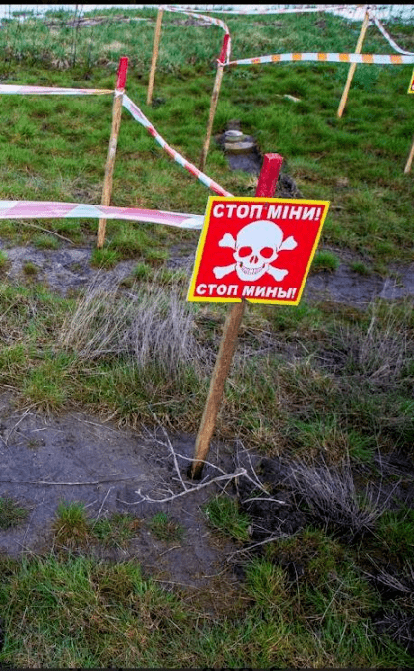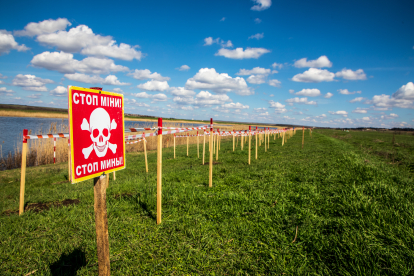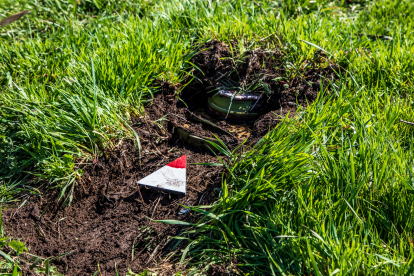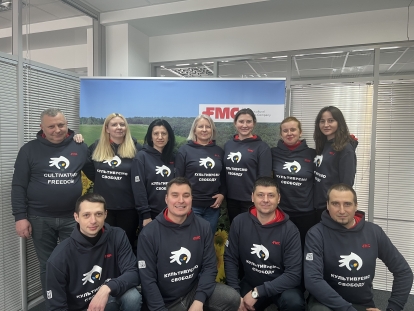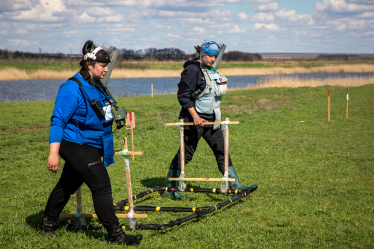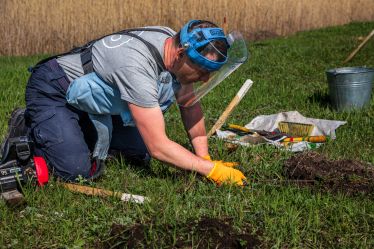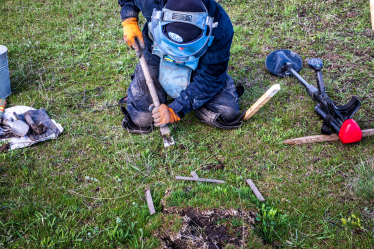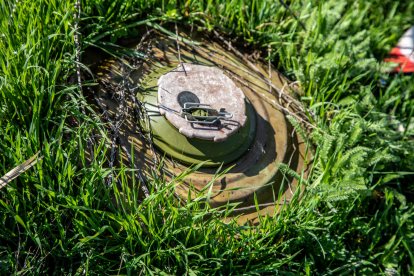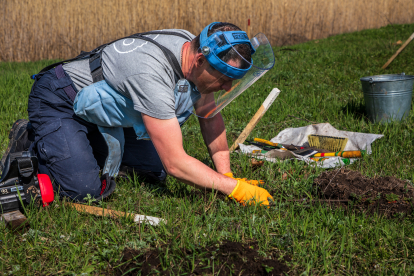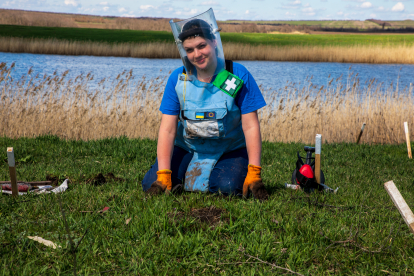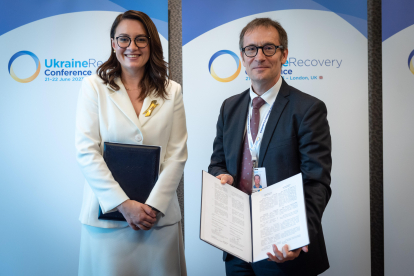How to support the agricultural sector, the main driver of the Ukrainian economy?Private companies are investing in farmersʼ safety by helping to clear fields of mines.
"Weʼll fix the equipment now and go back into battle,» says Oleksandr Kryvtsun. No, he is not a soldier of the Ukrainian Armed Forces, as these words might suggest. He is an ordinary farmer, the owner of the Grakove agricultural company, who grows wheat and corn in his fields in eastern Ukraine, in Kharkiv Oblast. And he uses the word «battle» to describe his work because a significant part of his 2,000 hectares of land is still mined. «Last year, the front line passed through my fields,» he recalls, «so everyone was laying mines – both our troops and the enemy.ʼ Every time his tractor goes into the field, it is potentially a new explosion. Recently, Kryvtsun developed a remote-controlled tractor to clear his fields of mines without risking the lives of his workers.
Training at The HALO Trust with Robocut: remote-controlled machine cuts vegetation before manual demining. Photo courtesy The HALO Trust
Mines covering two Austrias
Hundreds of farmers across the country face similar problems. As a result of Russiaʼs armed aggression, Ukraine has quickly become the most dangerous country in the world. 470,000 hectares of agricultural land have been mined. This is the official data of the Ministry of Agrarian Policy and Food, released by Minister Mykola Solsky at the end of April 2023. According to the State Emergency Service (SES), about 30% of the countryʼs territory is mined. President Zelenskyy, referring to the scale of this problem, gave a vivid comparison: the total area of mined territories is «twice as large as the area of Austria».
Not only the state helps to solve this level of problems. Private business is investing its resources in the safety of farmers and the entire country. «The mining of agricultural land is a nationwide problem that causes enormous losses both in the domestic market and in the world as a whole. Recognizing this, we did not leave farmers alone with the consequences of Russia’s aggression – the mining of fields. We decided to transfer 3% of our sales in Ukraine to help the international organization The HALO Trust, a world-recognized leader and expert in demining,» says Natalia Savchenko, CEO of FMC Ukraine.
The company called this initiative Cultivating Freedom. «With the support of FMC, we will send demining teams and critical equipment,» says James Cowan, CEO of The HALO Trust, «to clear the land for Ukrainian farmers.»
Sponsors’ help allows deminers to expand their activities and speed up demining. Currently, there are more than 100 The HALO Trust teams in Ukraine, working in five oblasts: Sumy, Kharkiv, Kherson, Mykolaiv, and Zaporizhzhia. The total number of employees is about 800, but by the end of 2023 there will be 1,200 specialists. «We are constantly recruiting new people to quickly start exploring and demining the liberated territories,» The HALO Trust said.
Natalia Savchenko (top center), CEO of FMC Ukraine, and the Ukrainian team. Photo courtesy of FMC press service
Unfortunately, the words «back to battle» by farmer Oleksandr Kryvtsun from Kharkiv Oblast are not a metaphor. Since the beginning of the full-scale war, many SES workers have already been killed during demining. Reports of tractors being blown up in farmersʼ fields are constantly appearing in the news.
The HALO Trust conducts manual demining, Mykolaivka village, Kharkiv region. Photo courtesy The HALO Trust
The combine blew up on a mine, the village of Mykolaivka, Kharkiv region. Photo courtesy The HALO Trust
Mine clearance with the help of large loop detector, Vasylivka village, Mykolaiv region. Photo courtesy The HALO Trust
The HALO Trust deminer conducts manual demining, Vasylivka village, Mykolaiv region. Photo courtesy The HALO Trust
Photo courtesy The HALO Trust
Minefield, Mykolaivka village, Kharkiv region. Photo courtesy The HALO Trust Фото предоставлено пресс-службой
70 years to clean up?
To help the population navigate the terrain, the SES released in April 2022 an online map of mined areas, which is constantly updated. As of the end of April, only 17.5% of the mined areas had been surveyed, Minister Solsky reported in April. At first glance, this figure seems insignificant. But in reality, 17.5% in less than a year is a lot. «It takes almost a day for one sapper team to clear a 10-meter-wide passage and 50-meter distance to cover,» according to the official calculations of the Interregional Center for Humanitarian Demining and Rapid Response of the State Emergency Service of Ukraine. That is why SES experts have already pointed out that full demining of all land will take many years.
There are several reasons for such conservative forecasts. The first is the extremely dense location of explosives in the occupied areas. «The longer the enemy stays in a particular temporarily occupied territory, the larger the area of mines,» said Ihor Klymenko, Minister of Internal Affairs of Ukraine, in April this year. He is in charge of the State Emergency Service, which is responsible for demining, among other things. According to the minister, sappers find mines not only in private homes, but also in childrenʼs rooms, schools, and on power and gas lines. Minister Klymenko called it «total mining of the territory.»
The HALO Trust deminer conducts manual demining in Vasylivka village, Mykolaiv region. Photo courtesy The HALO Trust
The second reason is the variety of new mines left by the Russians. The fact is that not all mines can be detected by a metal detector. For example, anti-personnel mines are made of plastic, and a metal detector simply wonʼt «hear» or «see» them. The terrain also hinders detailed study, and seasonality also affects the work, as it is much more difficult to work in winter.
The scale of the demining tasks necessitated increasing the number of SES personnel. 400 new sappers will start working in June-July, and another 500 people began training in April 2023.
In fact, countries have not faced a war of this magnitude for more than 80 years, so no state could solve the demining problem alone.
«Through this collaboration, we aim to create a future where farmers can work their land without fear of explosive remnants of war and this will also directly contribute to improving regional food security».
Sebastia Pons FMC Vice President and President EMEA
That is why the government gives very conservative forecasts on the timeframe for the complete cleanup of war-contaminated land. «Given the scale of the contamination, demining will take 70 years with the resources available to Ukraine,» said Ukrainian Economy Minister Yulia Svyrydenko in March of this year.
In early April, the Ukrainian government, citing World Bank estimates, said that «the full range of humanitarian demining work will cost $37.4 billion.» This is a huge sum for a country whose GDP, according to the same World Bank, is about $200 billion. At the same time, in early April, Prime Minister Denys Shmyhal himself appealed to the countries of the world, including the G7, for help with demining.
Demining specialists from the State Emergency Service, The HALO Trust and other organizations are clearing the Ukrainian land «centimeter by centimeter». Photo courtesy The HALO Trust
The international company FMC, one of the top five agrochemical companies in the world, took a proactive stance to solving this problem, announcing funding for demining even before the Ukrainian government called for it.
«Through this collaboration, we aim to create a future where farmers can work their land without fear of explosive remnants of war,» said Sebastia Pons, FMC Vice President and President EMEA, «and this will also directly contribute to improving regional food security.»
In addition, FMC, an international company with operations in more than 100 countries, was one of the first to withdraw from the market of the aggressor country. However, many private companies have only pretended to leave the Russian market, which brings them large profits. In January 2023, researchers at the University of St. Gallen in Switzerland published a study showing that only 8.5% of companies from the EU and G7 countries left Russia after its full-scale invasion of Ukraine.
Any demining is divided into several stages. First, experts check critical infrastructure facilities. Then, they fly over the area with drones to see the most potentially dangerous objects. And only then do they start searching the fields with a metal detector.
Bohdan Hrechko, Senior Supervisor on Demining in The HALO Trust Ukraine. Photo courtesy The HALO Trust
Demining specialists from the State Emergency Service, The HALO Trust, and other organizations are clearing the Ukrainian land «centimeter by centimeter,» says Savchenko. She is inspired by the persistence and meticulousness with which the specialists approach this work. «They inspect the sites of enemy rockets and mines, collect unexploded and exploded ammunition, and do everything to enable farmers to work,» says the FMC director.
The devastating impact
Russiaʼs aggression is taking not only the lives and health of Ukrainians. The war is undermining the countryʼs economy and agribusiness, one of its most important sectors. «Before the full-scale invasion, the share of agriculture in Ukraineʼs GDP was the highest among all sectors of the economy at more than 10% in 2021,» Savchenko says.
The country was also one of the worldʼs top five exporters of sunflower, barley, rapeseed, corn, and wheat, but due to Russian aggression, 24% of Ukraineʼs land is currently mined. As a result, the country lost about 10 million tons of crops in 2022, and according to the Ministry of Agrarian Policy and Food, direct and indirect losses in agriculture totaled more than $40 billion.
There are other consequences: 93% of small farmers report a significant increase in costs and 90% report a decrease in prices. This is stated in the latest study by the Food and Agriculture Organization of the United Nations about the impact of the war on agricultural enterprises, published in April this year.
Minefield, Mykolaivka village, Kharkiv region. Photo courtesy The HALO Trust Фото предоставлено пресс-службой
«In 2022, 40% less wheat was harvested than before the war, and in general, this is the smallest harvest in the last 10 years,» emphasizes Savchenko. FMC is helping to solve this problem by providing farmers with modern and safe plant protection products and innovative technologies.
«FMC has proved to be a reliable partner,» says Petro Yevych, owner of the Ukrainian agricultural company Agroros, «the company is committed to Ukraine and our farmers.»
Recognizing the challenges facing Ukrainian agriculture, FMC recently signed a Memorandum of Cooperation with the Ministry of Economy of Ukraine during the Ukraine Recovery Conference 2023 in London.
Yulia Svyrydenko, First Vice Prime Minister, Minister of Economy of Ukraine, and Sebastia Pons, FMC Vice President, President, EMEA. Photo courtesy FMC
The document covers four main areas of cooperation to help the agricultural sector and economic recovery. These include food security, innovation, farmersʼ security, and knowledge transfer and capacity building. In particular, this cooperation will provide Ukrainian farmers with priority access to the latest technologies and crop protection products, such as Arc™ farm intelligence and 3RIVE 3D®.
«I am extremely proud of our long-term support for Ukrainian agriculture. Todayʼs agreement is an important milestone that continues FMCʼs commitment to supporting food production in Ukraine,» commented Sebastia Pons.
3Rive 3D® – the latest technology of pesticide application
With faith in victory
In September 2022, the Ukrainian Armed Forces liberated the village of Hrakovo, close to Kryvtsunʼs fields. Subsequently, the Ukrainian army liberated almost the entire Kharkiv Oblast. But this year, Oleksandr Kryvtsun was able to sow only half of his land, and the rest is still waiting for demining. He is grateful to all the sappers who are helping him to restore his farm, and to The HALO Trust and everyone who supports these projects. «The sappers showed me a map of the mines in the fields; I was amazed at the quality of their work,» he recalls. In the last three months alone, 350 different explosive devices were found where he used to harvest crops. But he is confident that next year he will be able to sow all 2,000 hectares of his farm. It is the help of sponsors and the participation of private business in demining that is restoring the Ukrainian economy, making the state stronger and bringing victory closer.
Вы нашли ошибку или неточность?
Оставьте отзыв для редакции. Мы учтем ваши замечания как можно скорее.

